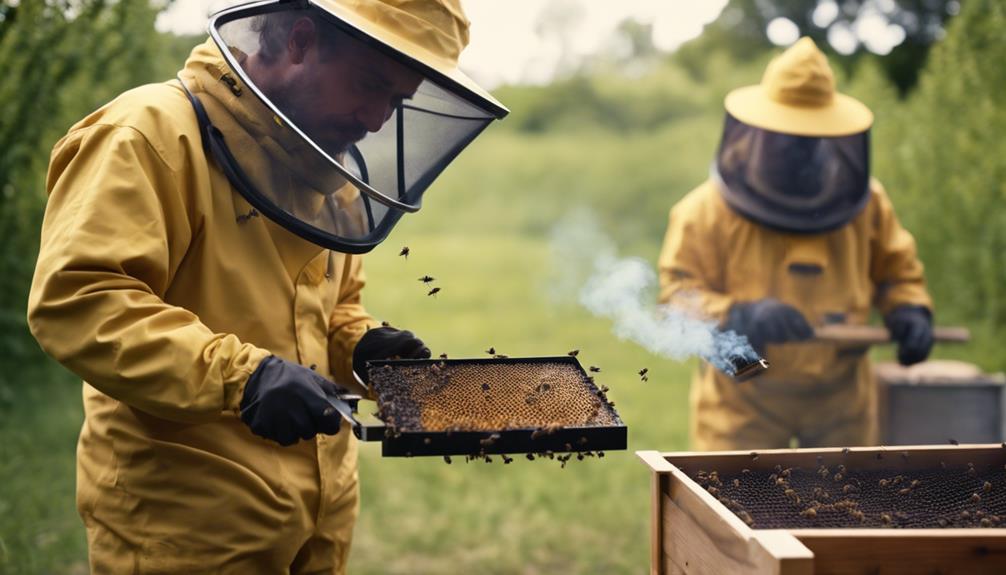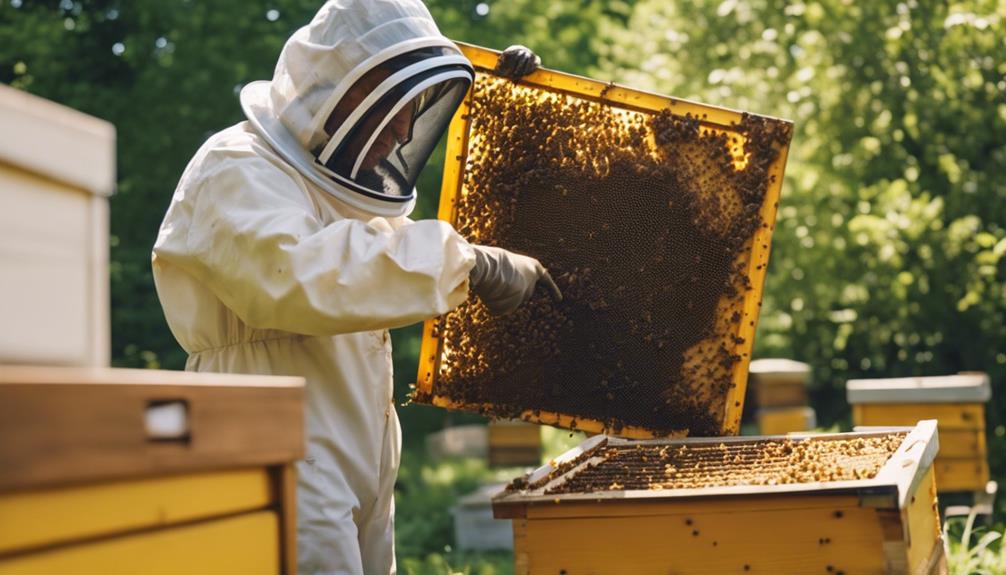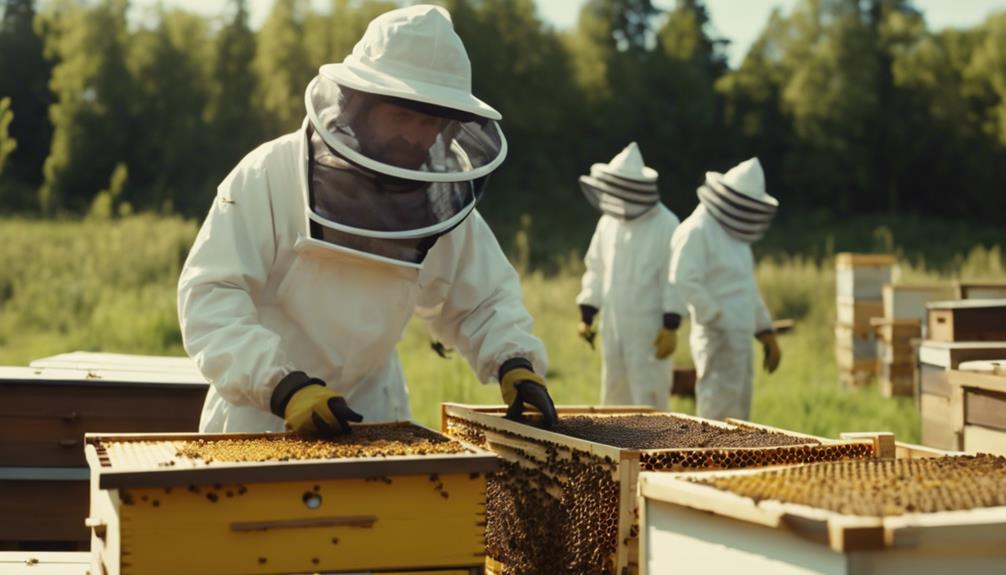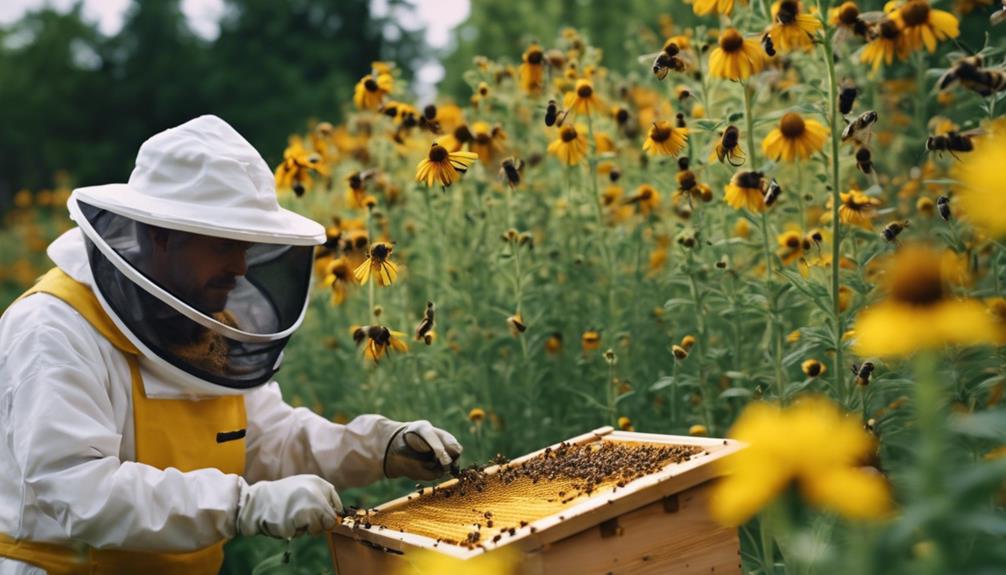In regards to beekeeping, having a smoker can be a game-changer! These handy devices work wonders by calming bees, making hive inspections a breeze, and improving bee behavior overall. From masking alarm pheromones to encouraging bees to feast on honey, smokers are a beekeeper’s best friend in the apiary. If you’re curious about how smokers can enrich your beekeeping experience, keep exploring—it’s a fascinating journey!
Main Points
- Smokers calm bees and enhance safety during hive inspections.
- Individual preference and risk tolerance influence smoker use.
- Proper smoker usage improves beekeeping practices.
- Understanding when and how to use smokers is essential.
- Decision to smoke or not depends on beekeeper judgment and hive conditions.
Benefits of Using a Bee Smoker
Using a bee smoker when working with bees provides several benefits for beekeepers.
The smoke from the smoker helps to calm the bees by masking their alarm pheromones, which are released when they feel threatened during hive inspections. This calmness reduces the bees’ defensive response, making it safer for beekeepers to manage the hive.
Additionally, the smoke triggers the bees to gorge on honey, making them less likely to sting during inspections. The fear of fire induced by the smoke also encourages bees to prepare to leave the hive, further aiding in beekeeper safety and efficient hive management.
Factors to Consider When Using a Smoker
When contemplating the use of a smoker in beekeeping, it’s important to assess key factors that can improve hive management and beekeeper safety. A bee smoker’s ability to calm bees by masking alarm pheromones is critical during hive inspections, reducing the chances of bee aggression.
Choosing the proper fuel for your smoker is crucial as it directly impacts the quality of smoke produced. Opting for organic smoke sources not only benefits the bees but also helps maintain the organic status of your honey.
Beekeepers should prioritize learning how to use a smoker safely and maintaining it properly to guarantee successful beekeeping practices. By mastering these factors, beekeepers can navigate hive inspections smoothly and keep their bees content with a gentle wisp of smoke.
Alternatives to Traditional Bee Smokers

Investigating innovative approaches to soothe bees, beekeepers are increasingly turning to alternatives beyond traditional bee smokers. Some organic beekeepers choose natural substances like chamomile or lavender to relax honey bees without compromising their organic status.
Electric bee smokers, a contemporary alternative to traditional smokers, are gaining popularity for their convenience and eco-friendly operation. Additionally, calming methods such as vibration or essential oils offer beekeepers alternative ways to keep their bees peaceful during inspections.
These alternatives provide various options for beekeepers looking to improve their beekeeping practices with effective, sustainable, and bee-friendly calming techniques. By exploring these modern alternatives, beekeepers can select the method that best suits their preferences and aligns with their values in beekeeping.
Tips for Effective Smoker Utilization
To improve hive inspections and manage bee behavior effectively, it’s vital to master the art of utilizing a smoker with precision and care.
When using a smoker, remember to puff smoke at the hive entrance before opening it to prepare the bees for inspection. Maintain a steady smoke flow to disrupt communication among the bees and make it easier to manipulate frames.
It’s important to apply the smoke in moderation to avoid overusing it and guarantee the best calming effect on the bees. Always wear the appropriate protective gear and store the hot smoker safely after use to prevent accidents.
These safety precautions won’t only protect you but also create a more harmonious environment for you and your bees.
Making an Informed Decision: To Smoke or Not to Smoke

We consider various factors and preferences before deciding whether to use a smoker in beekeeping practices. When pondering the use of smokers, beekeepers weigh the following key points:
- Beekeepers use smokers to calm bees, reduce aggression, and make hive inspections safer.
- Individual preferences play a significant role in the decision to use smokers, as some beekeepers opt not to for organic reasons or personal aversions.
- Hive conditions and risk tolerance also influence the choice, as understanding when and how to use smokers can greatly improve beekeeping practices.
Ultimately, the decision to smoke or not to smoke hinges on a beekeeper’s judgment and the unique circumstances of their hives.

Roger Thomas is a seasoned beekeeper and hive architect with a deep-seated passion for sustainable living. His fascination with bees has shaped his professional career, giving him practical and theoretical expertise in bee behavior, colony health, and optimal hive conditions. Roger’s technical skills shine in his bespoke hive creations that cater to the specific needs of diverse bee species, while his sustainable practices promote environmental balance and the wellbeing of the bee population.
As he continues his journey in beekeeping, Roger has become a dedicated advocate for responsible practices and an insightful educator in his field. His posts aim to inspire new beekeepers, underline the importance of sustainability, and showcase the remarkable contribution bees make to our ecosystem. Roger invites you to join him as he delves into the world of bees and the rewarding, honey-sweet art of beekeeping.


